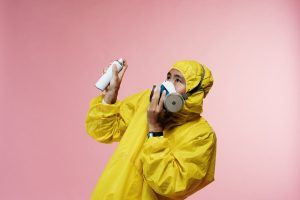The world is being taken over by a strain of coronavirus that is causing chaos around the world. COVID-19 is a disease that targets the respiratory system. Whether you are an employer or someone working within the construction industry, you need to be able to identify and manage the health and safety risks that come with both avoiding exposure to COVID-19 and what to do if you suspect you may have it. Businesses need to plan their response at work and what to do to avoid the spread of coronavirus and protect the health and well-being of construction workers and the wider community. Preventing illness and death in the workplace by providing training is nothing new to construction workers. Just as height safety training is provided, so are new coronavirus safety briefing measures.
COVID-19 spreads just like the flu does:
- Close contact with infected people
- Touching things that have been contaminated by the germ
The symptoms of COVID-19 are similar to flu-like symptoms and include tiredness, shortness of breath, a cough, a sore throat and fever. Many who were infected have gone on to fully recover while others developed other problems that lead to pneumonia. Those who have chronic medical conditions, are elderly or have a weakened immune system are at a higher risk.
Self-isolation
Anyone who works on a construction site should quarantine themselves if they have:
- Travelled overseas within 14 days
- Have been close with someone who has a confirmed case of COVID-19
If you need to self-isolate, then you need to let your employer know and stay away from the workplace. If you become ill during your isolation, then you need to seek medical attention by calling and letting them know you suspect you have the virus.
It is the employer’s responsibility to make further arrangements so the workers that are isolating don’t come to work and may be provided with other working methods like office work that they can do from home.

How to prevent the spread
People need to be doing their bit to ensure we stop the spread of this virus. Hygiene practices that are used to protect against contagious illnesses can be used to help stop the spread of the virus.
For the workers
Clean your hands often with soap and warm water or if that is not available, then use an alcohol-based hand sanitiser.
If you cough or sneeze try to do so in your elbow. If you use tissues, dispose of them in the bin straight away, then go on and wash your hands. You need to avoid touching your face, mouth and nose along with shaking hands. Keep away from people who are unwell and try to remain at a safe distance of 1.5 metres from people if you can. If you feel unwell, then you need to stay home.
For the employers
Handwashing facilities need to be set up and all areas must be cleaned with disinfectant and properly sanitised often. Alcohol-based hand sanitiser and soap need to be provided along with tissues and other cleaning supplies. Promote good hygiene practices and remind staff of their health and safety duties.
Ensure workers are hygienic and clean at all times and ensure you have someone cleaning all high-touch surfaces such as workstations and door handles regularly to help stop the spread. Employers that are sick must stay home until they are fully recovered. The government provides up to date advice on what workplaces and individuals need to be doing. Ensure the workplace staff are updated and educated with any new changes or rules that may arise. Construction workers are used to all sorts of training and safety measures such as first aid training and specialised equipment safety training. Therefore, they should be able to easily comply with new working measures to protect everyone from COVID-19.




